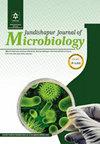巨细胞病毒更昔洛韦耐药肝移植患者UL54基因668 ~ 672位点的新重复
IF 0.5
4区 医学
Q4 MICROBIOLOGY
引用次数: 0
摘要
背景:在肝移植受者中,人巨细胞病毒(CMV)感染是一个值得关注的问题。更昔洛韦是治疗广泛的巨细胞病毒感染的首选药物。在某些情况下,患者可能需要对更昔洛韦耐药的巨细胞病毒感染进行高剂量治疗,尽管肝移植患者接受了更昔洛韦和缬更昔洛韦的长期预防治疗,但报告了更昔洛韦耐药巨细胞病毒感染的罕见病例。负责编码脱氧核糖核酸(DNA)聚合酶的UL54基因的突变可导致耐药性。目的:本研究的重点是UL54突变及其与更昔洛韦耐药性的关系。方法:本研究对2015年至2017年在Namazi和Abu Ali Sina医院移植科住院的23例肝移植受者进行调查。采用实时荧光定量聚合酶链反应(PCR)法检测巨细胞病毒感染。用巢式PCR法电泳发现UL54突变,PCR产物用Sanger法测序。使用Finch软件(版本1.4.0)进行序列分析和定位UL54突变。结果:在对来自23例患者的52个样本进行测序后,在9例cmv感染患者中发现了25个UL54基因突变,这些突变发生在移植后32天。这些突变包括S655L(10/9, 40%)、N685S(8/9, 32%)、F669L(4/9, 16%)、A688V(2/9, 8%)和新型AK124703.1: p.V668-G672dup(1/9, 4%),在UL54基因中位时间为2年的9例肝移植受者中检测到。此外,还进行了系统发育分析,以调查从伊朗人群中分离的巨细胞病毒中这些突变的起源。结论:考虑到更昔洛韦治疗已导致耐药突变,特别是新的AK124703.1:p。V668-G672dup突变,治疗效率低下,有必要确定耐药CMV菌株并密切监测这些患者。这包括确定病毒载量,评估对治疗的反应,并定期识别无反应,直到病毒载量完全根除,以确保治疗的有效性。本文章由计算机程序翻译,如有差异,请以英文原文为准。
A New Duplication in 668 to 672 Sites of UL54 Gene in Cytomegalovirus Ganciclovir Resistant Liver Transplanted Patients
Background: In liver transplant recipients, human Cytomegalovirus (CMV) infection is a significant concern. Ganciclovir is the preferred medication for treating widespread CMV infections. In some cases, patients might require high doses of treatment for CMV infections that are resistant to ganciclovir, although liver transplant patients who have received extended ganciclovir and valganciclovir prophylaxis have reported infrequent cases of ganciclovir-resistant CMV infections. Mutations in the UL54 gene, responsible for encoding deoxyribonucleic acid (DNA) polymerase, can result in resistance. Objectives: In this study, the focus was on UL54 mutations and their association with ganciclovir resistance. Methods: In this study, 23 liver transplant recipients who were admitted to the transplant departments of Namazi and Abu Ali Sina hospitals within 2015 and 2017 were examined. Cytomegalovirus infection was then confirmed in them using the quantitative real-time polymerase chain reaction (PCR) method. The UL54 mutations were found after electrophoresis using the nested PCR method, and the PCR products were subsequently sequenced using the Sanger method. Sequence analysis and locating of UL54 mutations were performed using Finch software (version 1.4.0). Results: After sequencing 52 samples from 23 patients, 25 mutations in the UL54 gene were identified in 9 patients who were CMV-infected, occurring at a median of 32 days after transplant. These mutations, including S655L (10/9, 40%), N685S (8/9, 32%), F669L (4/9, 16%), A688V (2/9, 8%), and the novel AK124703.1: p.V668-G672dup (1/9, 4%), were detected in 9 liver transplant recipients over a median period of 2 years in the UL54 gene. Furthermore, a phylogenetic analysis was conducted to investigate the origins of these mutations in CMV isolated from the Iranian population. Conclusions: Considering that treatment with the drug ganciclovir has led to resistance mutations, particularly the new AK124703.1:p.V668-G672dup mutation, and inefficiency in treatment, it is necessary to determine drug-resistant CMV strains and closely monitor these patients. This includes determining viral load, assessing response to treatment, and identifying non-response at regular intervals until the viral load is completely eradicated in order to ensure the effectiveness of the treatment.
求助全文
通过发布文献求助,成功后即可免费获取论文全文。
去求助
来源期刊

Jundishapur Journal of Microbiology
MICROBIOLOGY-
CiteScore
1.30
自引率
0.00%
发文量
56
审稿时长
6-12 weeks
期刊介绍:
Jundishapur Journal of Microbiology, (JJM) is the official scientific Monthly publication of Ahvaz Jundishapur University of Medical Sciences. JJM is dedicated to the publication of manuscripts on topics concerning all aspects of microbiology. The topics include medical, veterinary and environmental microbiology, molecular investigations and infectious diseases. Aspects of immunology and epidemiology of infectious diseases are also considered.
 求助内容:
求助内容: 应助结果提醒方式:
应助结果提醒方式:


